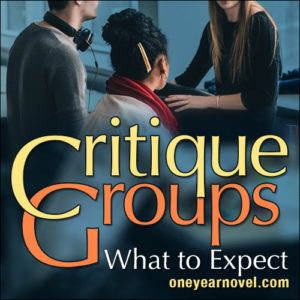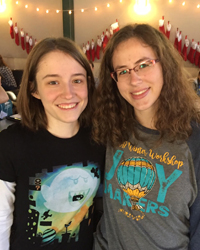Critique Groups: What to Expect
 An interview by Tineke Bryson
An interview by Tineke Bryson
One of the most exciting aspects of the Summer Workshop is also—for some!—the most intimidating: critique groups. Every afternoon, students spend several hours in a small group setting where they give and receive input on passages from their novels. It’s a really amazing opportunity to grow as a writer and to forge new connections, but if you haven’t ever shared your writing with strangers before, it’s a bit of a nerve-wracking thought!
For that reason, I decided to ask the two members of our team—Rachel Garner and Gabrielle Schwabauer—who organize the critique groups to share their perspectives. Getting a peek behind the curtain of their process can reduce any anxiety you might feel about the critique group experience. I’m sure you want to know what to expect!
Can you tell me about your process—how you choose the members of each group? Is it totally random?
RACHEL: We have some base factors we tend to consider for each group and individual. In groups, we try to keep the average age around the average age of workshop attendees as a whole, so younger attendees don’t feel stranded in “older” groups or vice versa. Since our OYAN guys are often outnumbered by girls, we also always pair at least two guys in a group. Since a number of students attend more than one workshop, we reference past workshop groups to make sure we’re not repeating old decisions. We also specifically ask about first-time attendees on registration forms so we can make the first experience as comfortable as possible!
GABRIELLE: Yeah, it’s definitely not random. It’s less about choosing members for groups we already have in mind, and more about shaping a group as we go, so any factor is fair game for consideration. Several years ago, when Rachel was living with my family for a year, Rachel and I even arranged slips of paper with the names of each critique group on the carpet and tried to rank them by “loudness potential” using spare coins we found in a jar. So anything goes! But it’s really not a science. There’s a limit to how much we can guess about a person or a group dynamic, so sometimes we just go with a strong gut feeling.
Why do you stick with 8 people per group?
RACHEL: Part of it is that medium-sized groups tend to best facilitate both intimacy and a range of opinions for novel feedback. But the other part is simple math! We schedule two and half hours each afternoon for critique groups, which works out to 18.75 minutes per person per day. With the bunny trails that tend to come with healthy group dynamics, it’s safer to time everything to about 15 minutes per person. That’s usually enough time to get the excerpt read and a reasonable amount of group discussion.
Who are the leaders, and how do you pick them? Can students apply?
GABRIELLE: Leaders are always students 18 and older who have attended at least one Summer Workshop previously. We try to keep a balance between re-inviting students who have demonstrated strong critique group leadership abilities in the past and opening up new slots for students who haven’t yet had a chance to lead. In inviting new leaders, we look for responsibility, kindness, writing ability, and community investment, but there are no hard-and-fast rules. We might ask someone who has dedicated a lot of time to offering advice on the Student Forum, or someone who went out of their way to be friendly and welcoming at the last workshop, or someone we’ve met in person and found to be trustworthy.
There is no formal application for critique group leadership, but students may email and offer to lead a group. We do not guarantee a leadership position to anyone. It can help us to know that you would say “Yes” if asked, but volunteering to lead does not increase or decrease your chances.
What’s a favorite memory you have from a workshop critique group?
RACHEL: As an older member of the community and long-time staff member, it’s easy to feel a little isolated at the Summer Workshop, since I’m afraid to barge into friend groups, and people are generally intimidated to approach me. The entire experience of leading my group Anvard in 2015 was a delight to me because I had a group that at least didn’t act like they were super intimidated by me. Whether it was renaming the group the Starship Anvard because of my Starfleet uniform (and then being referred to as Captain) or being relentlessly teased about a poor choice of words related to a character’s scar, the group always felt like it was on the edge of careening out of control and I absolutely adored it. The rest of the group even asked the MNU staff to change a whiteboard on the last day so it would welcome Robin Hood to the building. True love.
GABRIELLE: During the 2016 Winter Workshop, I ended up in a critique group of only six people—all female—because one attendee dropped out at the last second. On paper, our personalities and writing styles seemed difficult to mesh, but the group ended up clicking really well. On the last day, I went around the table and asked each person to tell me about something mildly annoying that they personally get absolutely incensed about, like an unreasonable level of rage for the topic. We laughed and laughed as each person started out self-aware, admitting “Oh, yes, I do get quite bothered about X, and it’s not a big deal, but . . .” and then inevitably flew into a fit of passion.
What do you appreciate most about critique groups?
GABRIELLE: I appreciate the exposure to a wide variety of story ideas. While of course you never want to steal a concept from another student, just hearing in-depth from other writers about their stories and characters and themes can be a wonderful stimulant for one’s own creativity. Critique groups also brings 7–8 people into a room who might not have met otherwise and gives them a chance to feel more comfortable and confident around students who might not have been their first choice for friends.
RACHEL: Though what Gabrielle mentioned is a big thing for me too, as someone who is socially anxious, I actually really appreciate the clear social structure of a critique group. I’m not required to interact with people randomly. I’m given a group and we’re all given a task to complete together: help each other become better writers. I love the camaraderie of that, and the fact that the conversation can easily settle around something I care deeply about: books.
What would you say to somebody who is really anxious about being in a critique group?
GABRIELLE: It’s cliché, but everyone else is almost certainly nervous as well. You might find your critique group leader intimidating, but the times I’ve led critique groups, I’ve been really anxious about doing a good job! You really will get through it and come out fine on the other end. Try not to psych yourself out too much or spend time agonizing over whether to read or not read your excerpt—just show up and read the words on the page as calmly and clearly as you can. Remind yourself that no one is judging you, you’re all in the same boat, and it will get easier once you’re familiar with each other.
Also, the vulnerability of sharing your story with a bunch of people tends to breed friendships, or at least an atmosphere of camaraderie. That doesn’t make it any less scary, but it helps me to remember that the fear can act as a bonding agent of sorts, too.
RACHEL: Mainly I would tell them that it is really normal, and that the first day is usually the hardest. I’ve attended every single summer (and winter) workshop; critique groups still make me anxious. Also, you are likely nervous because you care about your work. Getting feedback and caring about your stories are both critical to writing well. You can do this.
What was your first critique group like for you?
GABRIELLE: Rachel and I were actually in the same critique group during my first workshop in 2011, back when we barely knew each other. I hadn’t written a novel yet—I was just there because my parents run the workshops—so the stakes were a little lower for me, I think. I got to observe and critique without the pressure of sharing my own writing. I don’t recommend that most students do this, but for a student who is truly terrified of sharing, attending without excerpts is definitely a better option than not attending critique group at all.** Up until that first critique group, I was used to being invisible in OYAN, defined entirely by my relationship to the famous Mr. and Mrs. S. The best thing about the group for me was that I finally got to know some students as Gabrielle, not daughter-of-the-Ss. That was the first time I thought that OYAN might someday be my thing, too, not just my parents’ thing.
RACHEL: Even though I attended the 2010 workshop, it only had one day of critiquing, which can’t really be compared with the current structure of the workshops. So I also consider 2011 to be my first critique group. I definitely had one of my best experiences right out of the gate, which was very encouraging since I also had to lead the group. Although I had some varying amount of connection with a few people in the group before it began, it really surprised me how much we were able to bond over four days. We had multiple inside jokes and spent an inordinate amount of time on the last day taking group pictures. People from that group ended up including some of my closest friends. Although every critique group definitely doesn’t end with a dream team like that one did, and the social structure of OYAN has since changed somewhat, I always appreciate the camaraderie that forms.
** If you decide not to bring excerpts to your critique group, we do need to know ahead of time! Email us no later than June 1.
Do you have any tips for how to get the most out of the experience?
GABRIELLE: Practice being really precise about what works and what doesn’t work. The more specific you can be, the better. Saying “I really liked it!” might feel good to you and make the other person smile, but it doesn’t help them in any meaningful way. Telling them that their dialogue feels true-to-life or that you connected deeply with the ally’s moral struggle gives them something concrete to hold onto while editing the story—and a deeper insight into possible strengths as a writer.
Also, avoid taking up time with short, grammar-type critiques that you can easily just mark on their excerpt.
While you definitely want to stay productive, don’t be afraid to get slightly off-topic once in a while. You will be better critiquers and more comfortable readers if you let yourselves joke around and ask fun questions and share short personal stories every once in a while.
RACHEL: If you’re reading an excerpt and think you have nothing to say, focus on what the story is making you feel. Are you sad, confused, bored? As Mr. S. says, the goal of every story is to create emotion. What emotions is the writer creating in you? Let them know. It could be that you’re experiencing exactly what they want you to; and it could be that you aren’t. Either way, letting them know is a valuable insight.
One of the factors that we don’t consider when putting together critique groups is the genre of the writers involved. Even if we asked for this information on the registration form, I would be reluctant to use it because I think that getting opinions from a broad range of writers (and also readers) is really valuable. They’re more likely to see problems that you’ll be blind to as a frequent consumer of that genre. So I would suggest not dismissing the advice of students who write very differently from you.
In the same vein, we put groups of eight people together with the assumption that they will have different takes on things. You should feel free to disagree with something the rest of the group seems to have decided or, alternatively, to throw in your opinion even if it is really similar to group consensus. Don’t doubt your opinions based on what everyone else is saying. We’re all readers before we are writers, which means we already have a base understanding of story, and what we like and dislike.
It’s also okay to disagree with the feedback you’ve been given, as long as you listen carefully and honestly. You know your story best; instead of simply defending, explain. Explain what you’re trying to do, and listen to why or why not it is working for them. How you implement that feedback is up to you.
 …
…
Thanks very much, Rachel and Gabrielle!
For those of you who have followed this interview: If you have ANY questions or comments, go ahead and post a comment on this post! Or you can email us at info@oneyearnovel.com. Rachel and Gabrielle will be happy to chat!



Thank you, this was an excellent post! ❤️
This is super helpful. I love all the personal tips from Gabrielle and Rachel!